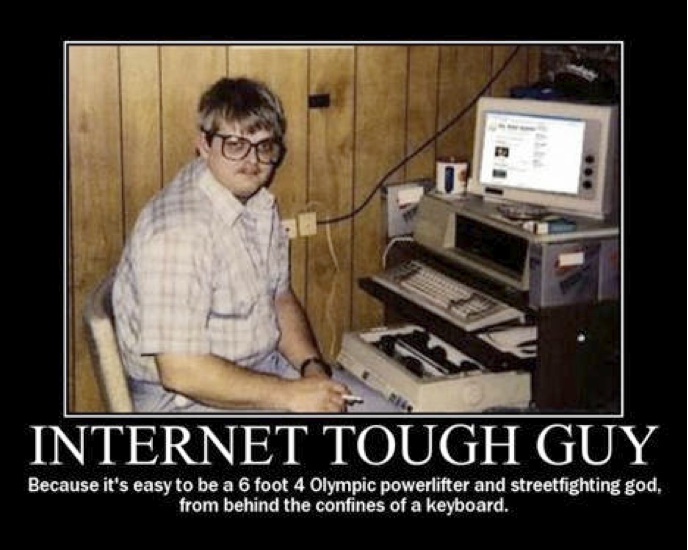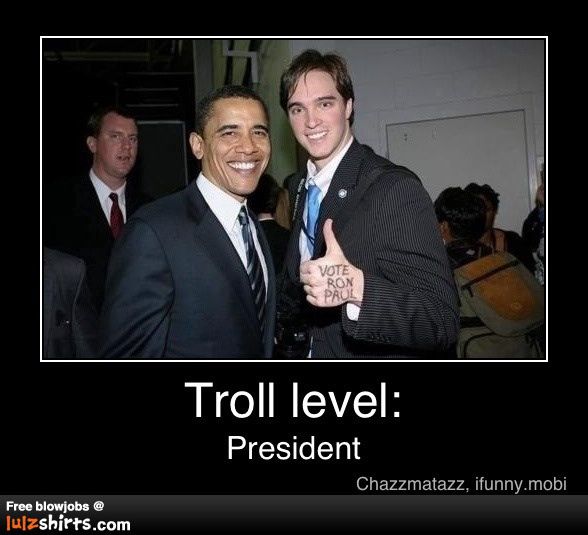If you’ve ever been called a troll or been told to stop trolling you may have wondered not only what that meant, but if you’re like me, where it originated from.
A troll or troller in internet slang is someone that starts arguments or upsets people by posting off-topic or extraneous messages in some type of online community. Their goal is to cause people to get emotional and to harass people online.
In the beginning of the Internet, the words troll and trolling had completely different meanings. Due to the lack of knowledge found online, the world trolling was confused with the word troll, and eventually the word troll picked up an alternative meaning. A troll is now a person that trolls or is a troller, not to be confused with what a real troll is.
This caused quite a bit of confusion and took awhile to catch on. Trolling was actually an intelligently derived term used to describe people online who were just looking to start an argument.
The word trolling is a word commonly used to describe a method of fishing. In trolling, a fisherman casts a line out into the water, usually several, and pulls them behind a boat, hoping that he will catch something.
A troller or someone that trolls is someone that casts a line out in the Internet world in hopes of hooking someone into an argument, pretty straight forward right?

Unfortunately, because of less intelligent people on the Internet that were accused of trolling, they didn’t understand the definition of the word, and thought it had something to do with trolls. Now, when referring to someone on the Internet that starts an argument for fun, they can either be called a Troller or a Troll, two nouns that at one time had completely different definitions.
If you like trolling on the Internet, the next time someone calls you a troll ask them to clarify if they mean troller or if they are calling you a troll, which is a supernatural being in Norse mythology and Scandinavian folklore. Obviously, being called a troll should be a compliment.
I was blessed (if that’s the proper word), with the opportunity to watch “trolling” become “troll” over my lifetime. It’s amazing how quickly the English language changes when it comes to slang. Up until it became official, I never understood if people were saying you were a acting like real troll, one that lived under a bridge and surprised or threatened to harm them.
The real definition of the word “troll” sometimes makes sense in place of the real definition of “troller”.
Check out the following examples:
Example 1:
User 1: “You see that cubs game last night?”
User 2: “Yeah, that home run in the 7th inning was great.”
Unexpected User: “Wasn’t that a great game?”
User 1 & User 2: “Wohh…Troll alert, who are you? You kind of snuck up on us there, we weren’t expecting that.”
This is in line with the mythology that trolls hide under bridges and are not seen until the last minute when they surprise people. Calling someone a troll in this instance basically means they surprised you.
Example 2:
User 1: “I don’t like it when you talk to me like that.”
User 2: “Hey man, you started it.”
Unexpected User: “Stop it before I kick both of your asses!”
User 1 & User 2: “Easy Troll, there’s no need to get all worked up.”
In this example they are using the word troll to identify your troll like threatening behavior.
The word troll has expanded into video games, especially RTS or MOBA games where users will intentionally mess with a game full of players just to waste their time or harass people. It can also refer to someone that is playing people below their skill level in order to dominate the game instead of playing against people of their own skill level.
Trolling is not something done just online either, here is a form of Presidential trolling.

And that’s where the internet slang meaning of troll came from and what it means, don’t you feel smarter now? You just got trolled!
Please clarify, this is how I interpret the explanation: people who posted comments intended to stir up or escalate controlversy and who were not well known amongst the community were said to be “trolling”. They were actually trollers but may or may not have been called out as such. As the meaning became confused, they were called “trolls”. The former relates to fishing while the latter is about the troll, or creature who lives beneath a bridge and demands a toll for persons to cross, otherwise they (the persons) may be eaten. Does that about sum it up?
Here’s my take: In the mythology, passersby had to pay a toll to a troll. The word similarity is, in all likelihood a coincidence, but you never know. When we changed from “trollers” to “trolls”, I would like to think that instead of an inaccurate alternative, it was a creative and logical extension of trelling. There’s a reason why the root word is the same – one was derived from the other, or both came from the same source. Originally, “trolling” only referred to the act of trolling and not the purpose. Later, the definition was extended to include characteristics of the troll – laying the bait, remaining hidden, surprise reveal, and victimizing the prey.
Please clarify, this is how I interpret the explanation: people who posted comments intended to stir up or escalate controlversy and who were not well known amongst the community were said to be “trolling”. They were actually trollers but may or may not have been called out as such. As the meaning became confused, they were called “trolls”. The former relates to fishing while the latter is about the troll, or creature who lives beneath a bridge and demands a toll for persons to cross, otherwise they (the persons) may be eaten. Does that about sum it up?
Here’s my take: In the mythology, passersby had to pay a toll to a troll. The word similarity is, in all likelihood a coincidence, but you never know. When we changed from “trollers” to “trolls”, I would like to think that instead of an inaccurate alternative, it was a creative and logical extension of trelling. There’s a reason why the root word is the same – one was derived from the other, or both came from the same source. Originally, “trolling” only referred to the act of trolling and not the purpose. Later, the definition was extended to include characteristics of the troll – laying the bait, remaining hidden, surprise reveal, and victimizing the prey.
One of the most convoluted explanations of anything that I have recently read. Oops! Does that mean I’m a troll now? By the way, you left out “troll the Yuletide carol.”
So wait what’s a Troll ?
A thing that lives under a bridge and kills goats.
So wait what’s a Troll ?
A thing that lives under a bridge and kills goats.
Fishing term is TRAWLING, not trolling.
Trolling is a method of fishing where one or more fishing lines, baited with lures or bait fish, are drawn through the water. This may be behind a moving boat, or by slowly winding the line in when fishing from a static position, or even sweeping the line from side-to-side, e.g. when fishing from a jetty.
Yes, it’s “trawling” in British English, but “trolling” seems to be a common US English spelling.
No, actually not true. Trawling is a method of fishing where you drag a net behind your boat to catch fish. Trolling is a method of fishing where you drag one or more single lines behind you boat. They are often confused because they sound similar and are both similar methods of fishing but they are still different terms and techniques. One is performed with single fishing lines while the other is performed with larger nets.
No, actually, trolling refers to throwing a fishing line, with hook but no bait, into the water, and then dragging it back-and-forth in the hope of it catching a fish. It is sometimes considered unsportsmanlike. The fish is simply stuck with a sharp hook.
“Less intelligent people” think it has to do with actual trolls. Well you’re naive to the internet and have formed your own opinion. But the origination came from World of Warcraft. Sort of like kek/bur. The trolls were a race that fit in poorly with RPers. Typically they used poor english and were notorious for breaking character. Whenever a troll was around on an RP server they were given crap for not “doing it right”. From their it moved to other places on the internet. I suggest before creating a definition you should learn more about internet culture. And when people first used the word. If you played WoW this is a no-brainer.
lol you are hilarious. Just to let you know this guy is closer than you are by a long shot. I was in the Alpha for World of Warcraft back then I was a wee lad testing for major companies under 18 and happy to participate for free tee shirts and coffee mugs. WoW did NOT create the term troll. QQ did come from Warcraft 2 however. Trolling the line was the origin but it was not the name for people baiting fights it was for seeking knowledge from insider hacking. You would have to understand the seeds of information via understanding the puzzle itself. Essentially you were tossing bait in hope of finding marks.It had many uses as it was also for the Black Hats and Grey Hats whom were stealing information and also for the Red Hats and White Hats whom used it for seeking more people for their cause. The internet was far less hostile when I was a kid.
Oh for cryin out loud…. WOW? Give us all a break, kiddo. Dump that hype. It sure wasn’t from WOW or the Warcraft before it even.
First use of rhe word troll as crossover between the physical world troll bridge example above and on social media was in an exchange on the YouTube video “Apollo 11 Press Conference” moon landing comments section in 2008 between artist Michael St.Mark and a then unknown American individual called Svector, later unmasked as Mark Gray. In the long exchange over many weeks, St.Mark suggested rhe abusive Svector should ” get back and hide under your coward’s troll bridge ” From that point several other YouTube users began using rhe word to descibe anonymous abusive social media comment posters. It was in that same year, 2008, that the famous drawing Troll Face was created.